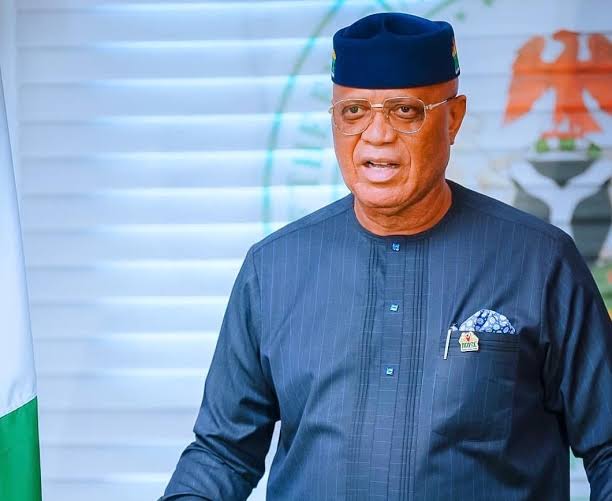Akwa Ibom State Governor, Pastor Umo Eno, has declared his unwavering support for President Bola Ahmed Tinubu’s re-election for a second term, stating he has “no apologies” for his endorsement. Speaking during a media parley in Uyo, the state capital, Eno emphasized that his decision stems from his belief in Tinubu’s leadership and the potential of the administration’s policies to drive Nigeria’s development. The governor’s bold stance has sparked discussions across political circles and social media platforms, where reactions range from praise for his loyalty to criticism over the timing of the endorsement.
Eno highlighted President Tinubu’s ongoing reforms, particularly the controversial Tax Reform Bills, as evidence of the administration’s commitment to economic progress. He argued that these policies, though challenging in the short term, are designed to strengthen Nigeria’s fiscal framework and promote sustainable growth. The governor urged Akwa Ibom residents to rally behind Tinubu, emphasizing that collective support is essential for the president to deliver the promised democratic dividends.
The endorsement comes at a time when Tinubu’s first term is still underway, with the next presidential election not scheduled until 2027. Some suggest that Eno’s statement may be strategically aimed at aligning Akwa Ibom’s political machinery with the All Progressives Congress (APC) ahead of future elections. Others, however, view it as premature, arguing that the focus should remain on evaluating the current administration’s performance before discussing re-election.
Eno’s governorship has been marked by efforts to promote unity and development in Akwa Ibom, including infrastructure projects and social welfare programs under his ARISE Agenda. His endorsement of Tinubu aligns with his broader vision of fostering collaboration between state and federal governments to achieve shared goals. He also praised Tinubu’s leadership style, describing it as inclusive and focused on addressing Nigeria’s long-standing challenges.
Public reactions reflect a polarized sentiment. Supporters of Eno commend his forthrightness, with one stating, “Governor Eno is showing leadership by backing Tinubu’s vision for a better Nigeria.” Conversely, critics question the governor’s motives, with some suggesting that the endorsement may be tied to political negotiations or federal allocations for Akwa Ibom.
The Tax Reform Bills, which Eno referenced, have been a focal point of national debate, with proponents arguing they will streamline Nigeria’s tax system and opponents warning of potential burdens on citizens. Eno’s support for these bills positions him as a key ally of the Tinubu administration in the South-South region, potentially strengthening Akwa Ibom’s influence in national politics. However, the governor’s critics argue that his endorsement overlooks the economic hardships faced by many Nigerians, including rising inflation and fuel prices.
Eno’s media parley also touched on his administration’s achievements, such as improvements in education, healthcare and rural development in Akwa Ibom. By tying his state’s progress to Tinubu’s national agenda, Eno seeks to project a unified front, encouraging other South-South governors to align with the federal government’s objectives. This move could bolster Tinubu’s support base in a region traditionally dominated by the opposition Peoples Democratic Party (PDP).
Analysts suggest that Eno’s endorsement may also be a calculated effort to secure federal support for Akwa Ibom’s development projects. The state has benefited from federal interventions in areas like road construction and oil and gas initiatives, which Eno has acknowledged as critical to his administration’s success. By publicly backing Tinubu, Eno may be positioning Akwa Ibom to receive further federal backing in the coming years.
The political landscape in Nigeria remains dynamic, with early endorsements like Eno’s setting the stage for intense politicking ahead of 2027. While some speculate that Eno’s statement could signal a broader realignment of political forces in the South-South, others caution that such endorsements risk alienating voters who are yet to see tangible benefits from Tinubu’s policies. The governor’s unapologetic stance, however, underscores his confidence in Tinubu’s leadership and his own political strategy.
Eno’s remarks have also drawn attention to his relationship with other regional leaders, some of whom have remained silent on Tinubu’s re-election prospects. His proactive endorsement could pressure other governors to clarify their positions, potentially reshaping political alliances in the region. For now, Eno remains focused on rallying Akwa Ibom residents to support both his state’s agenda and Tinubu’s national vision.
As Nigeria navigates economic and political challenges, Eno’s endorsement serves as a reminder of the complex interplay between state and federal politics. His call for unity and support for Tinubu reflects a broader appeal for patience with the administration’s reforms, even as public sentiment remains divided. Whether this endorsement will translate into political capital for Eno and Tinubu remains to be seen, but it has undoubtedly sparked a conversation about Nigeria’s future leadership.




